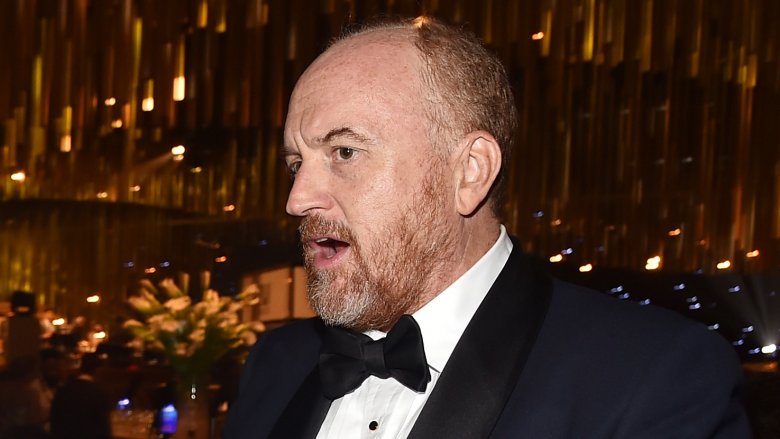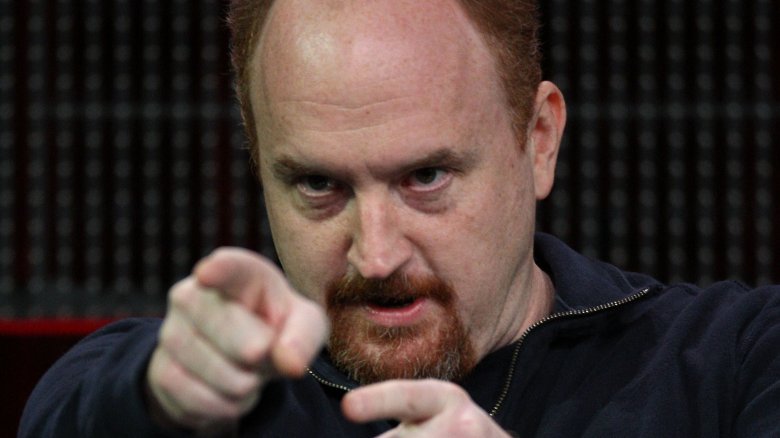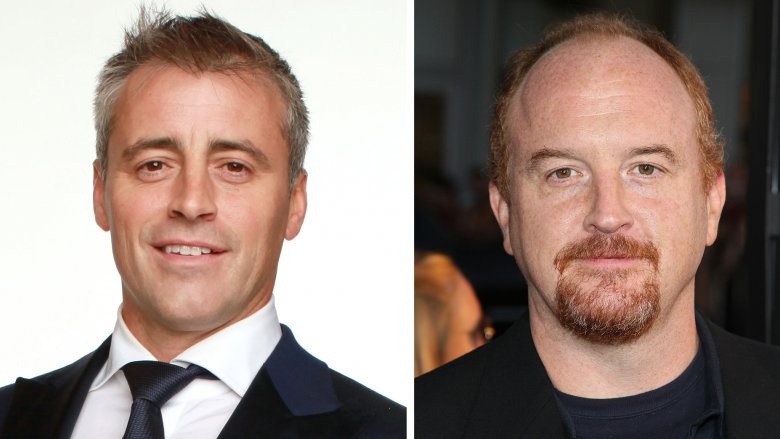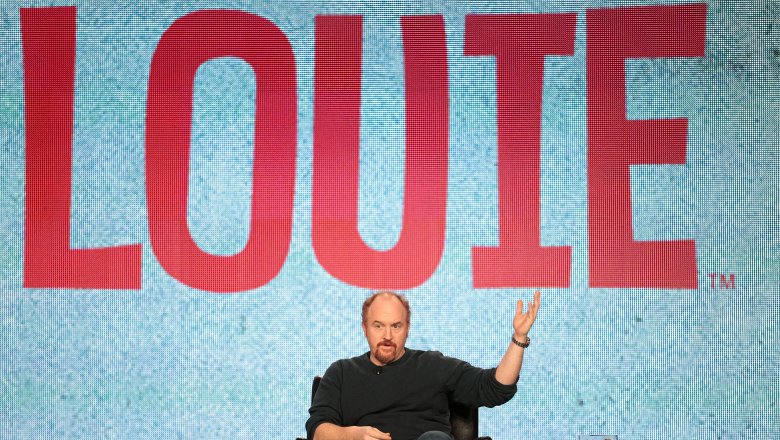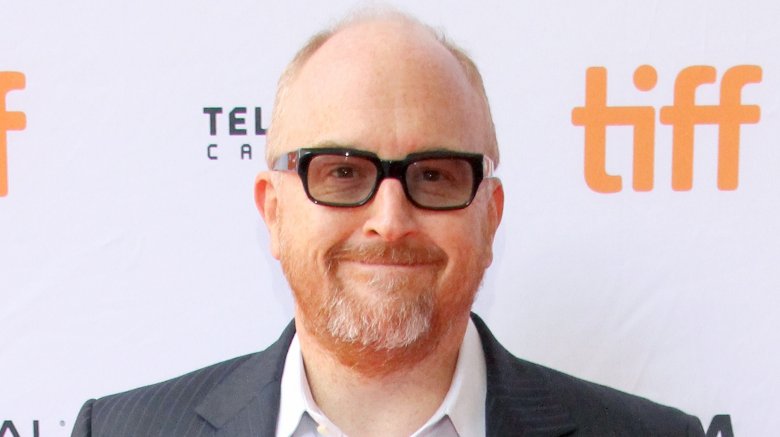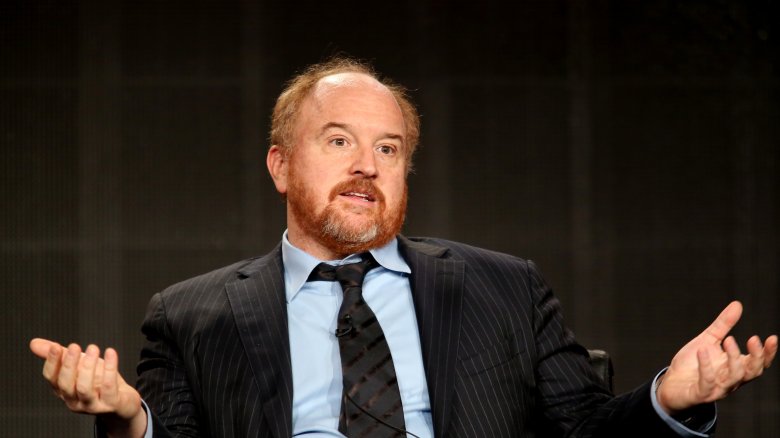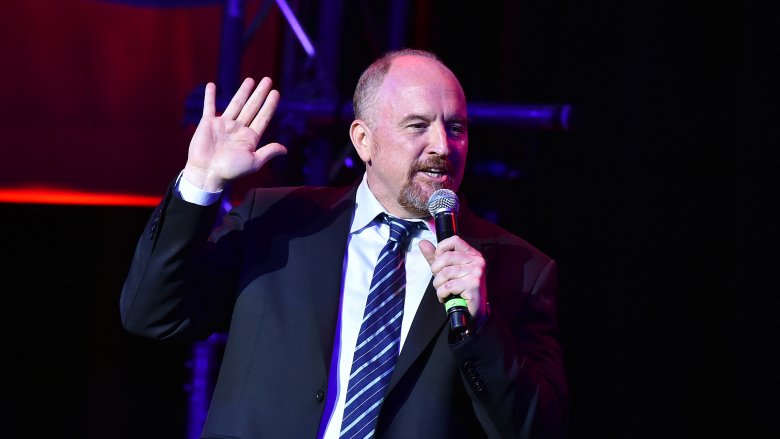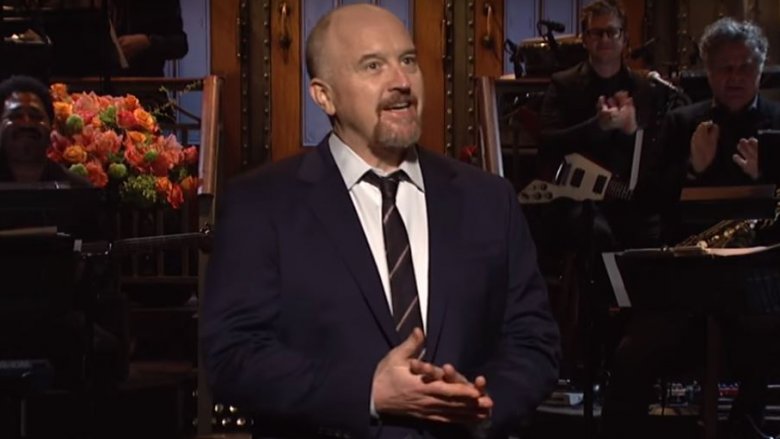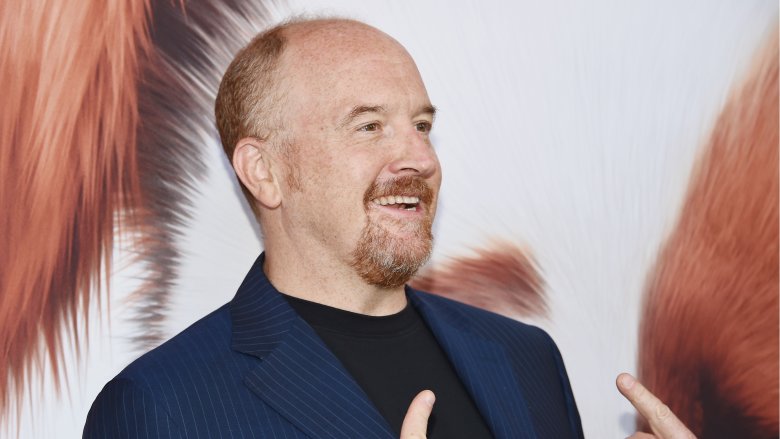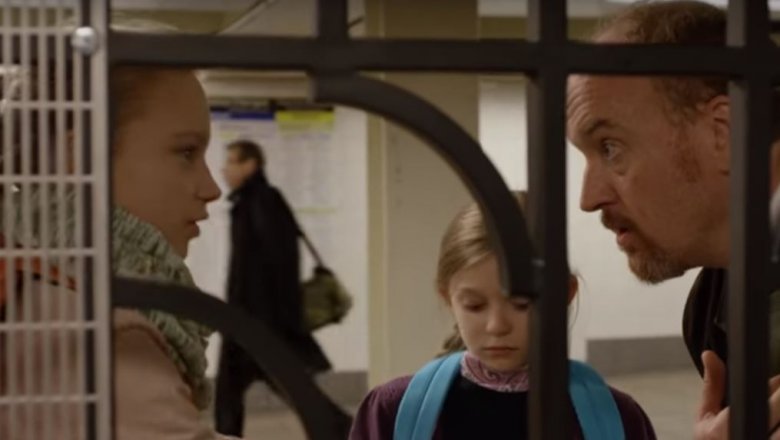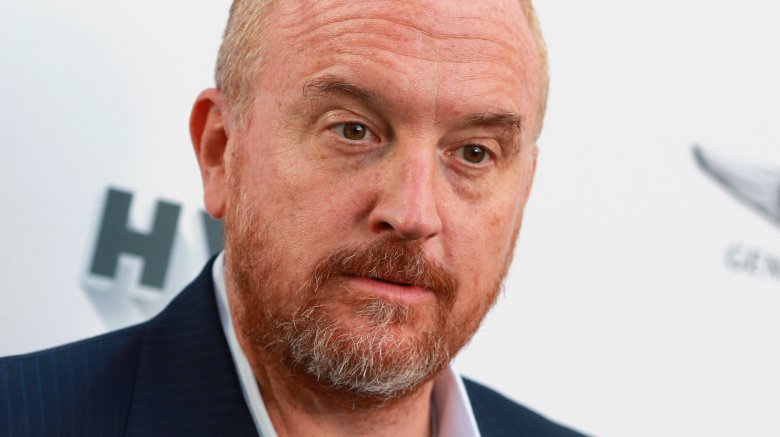The Untold Truth Of Louis CK
Over the last decade, Louis C.K. transitioned from a moderately successful stand-up into one of the world's most recognizable comedic faces into a seriously reviled figure. His on-stage success led to a critically acclaimed series, Louie, which exposed the public to his unvarnished and often hilarious take on life. He, in turn, exposed himself to lots of women who wanted nothing to do with that. In his act, C.K. left few personal stones unturned, sometimes even making jokes that we now recognize as descriptive of his serial harassment of women. Here are things you may not have known about Louis C.K.
He's an accomplished cult filmmaker
One look at Louis C.K.'s IMDb page reveals a long list of writing, producing, and directing credits. Somewhere between all the child-rearing and constant stand-up touring and public exposure, he found time to write and direct a number of surreal, entertaining, and even award-winning cult films.
According to Vulture, Louis first picked up a mic and a camera around the age of 17. His first mini-flick, Trash Day, is an oddball romp about garbage thieves. After his debut, C.K. directed an artsy comedic short, Caesar's Salad, which, as Splitsider notes, landed him on the festival circuit. His next film, Ice Cream, is an absurdist drama influenced by David Lynch and Woody Allen. Before it melted into the pop-culture tableau, his short made the rotation at Sundance and scored its director an award at the Alpine Film Festival. Most importantly, it helped C.K. snag several high-profile writing jobs, including a spot in the Late Night with Conan O'Brien writers' room.
A later scripting gig with The Chris Rock Show set up his first studio picture, Pootie Tang, a feature-length sketch starring the show's faux-Blaxploitation character. The comedian wrote and directed the picture but met with heavy resistance from the studio, since his vision diverged wildly from theirs. Paramount fired C.K. and re-cut the film, but it failed to find an audience, nearly killing his career in the process. If only...
He has dual citizenship in the U.S. and Mexico
Few comedians lampoon modern culture with as much insight and painful accuracy as Louis C.K. In part, his unique take on Americana likely derives from his upbringing as an immigrant.
As the comedian discussed in a Rolling Stone interview, C.K. was born in Washington D.C. but moved to Mexico City while still a baby. An interview with Tavis Smiley (who has also since been credibly accused of sexual misconduct) further reveals that his father, Luis, is Jewish, Hungarian, and Mexican. When he was 7, the family returned to the United States, settling in the suburbs of Boston. C.K. noted that he primarily spoke Spanish until he assimilated to his new surroundings.
While the stand-up admits he's forgotten much of his native tongue, he still retains citizenship in America and Mexico, holding a Mexican passport as well. C.K. also has joked that, while his poor grasp of English initially made growing up in Boston awkward, his background in Spanish helped him avoid sounding like a local.
He has donated to charity
In Hollywood, celebrities often put on a very public face about their pet causes, donating lots of loot to their favorite charitable organizations. Similarly, Louis C.K. also supports those in need, although his philanthropy hasn't always been part of a major PR campaign. (Although he could sure use one now.)
In 2011, he released a stand-up special, Louis C.K.: Live at the Beacon Theater, through his website for $5. As The Hollywood Reporter noted, the Internet-only performance netted him a cool million bucks. C.K. gave a quarter of it to several beneficent agencies, including the Fistula Foundation — which helps women recover from reproductive organ damage received during childbirth.
USA Today also reported that C.K.'s successful turn on Jeopardy! Power Players also brought in another $50,000 for the foundation.
He knows how to fight
On Louie, the loosely autobiographical main character is clearly averse to confrontation. In the aptly-titled third season episode, "Dad," the title character avoids dealing with his father by developing hives, stealing a motor-trike, and eventually winding up adrift in the ocean. The real Louis C.K., on the other hand, doesn't seem to fear physical confrontation. There's the disgusting version of that, but he also knows how to throw a punch or two.
In an interview with Terry Gross on Fresh Air, the comedian discussed taking up boxing as a way to stay in physical and psychological shape, explaining, "when you're boxing, you have to think under pressure, and that's what standup is like. So it was a good kind of metaphorical training."
For a time, C.K. trained with former boxer and fight trainer Michael "Micky" Ward. Ward himself is a retired boxer from Lowell, Massachusetts, who once held the WBU light welterweight title. His battling days are even chronicled in the 2010 Mark Wahlberg film The Fighter.
He went to school with Matt LeBlanc
The chipper, Gen-X-friendly laugh tracks of Friends seem worlds away from the way-too-realistic comedy of Louie. While the shows land on the opposite ends of the sitcom spectrum, the longtime NBC staple and the stripped-down FX series actually have something, or rather somewhere, in common: Newton, Massachusetts. It turns out that Matt LeBlanc, who played affable idiot Joey Tribbiani on Friends, and Louis C.K. both grew up in the Boston suburb. As the Boston Globe relates, they attended F.A. Day Junior High School together, later graduating from Newton North High in 1985.
The article also regales readers with a fun pictorial transition of their young lives. Although the senior yearbook photos are understandably nondescript, their junior high pics are somewhat indicative of their career paths and outlooks. LeBlanc appears in a ringer tee, and his quote for posterity reads: "remembers hockey; hates English." Conversely, C.K. wears a Sex Pistols shirt.
Louie's first season production budget was $200,000
After years of wading through the Hollywood quagmire, including his failed HBO series Lucky Louie, Louis thoroughly explored his options before attempting another trip into TV land. C.K. told the New York Times that FX president John Landgraf coaxed him to the network with nearly unprecedented creative freedom, albeit with a minuscule budget. The upstart network turned out to be the perfect place for him, particularly since his vision for the show was kind of unclear, as he explained to the Times, "I said, 'Let me shoot a pilot and you don't have anything to do with it. I won't even pitch you the idea or show you the script or show you the footage or show you the casting. Just wire me the money and let me do the show.' And he [Landgraf] was willing to do that." The anti-pitch worked, and Louie became a smash hit. While the acclaimed dramedy wasn't without its peaks and valleys, quality-wise and disgusting-in-retrospect-wise, it remained unsurprisingly C.K.'s baby the entire time.
He won't take pictures with fans
At one time, Louis C.K. had easily one of the most recognizable faces in the world. He probably couldn't go anywhere without catching an earful of his own punchlines or getting mobbed by autograph-seekers. However, it used to be that fans trying to snap a selfie alongside their favorite stand-up met with some serious disappointment. Nowadays, he'd probably welcome the attention, of course.
While speaking with David Steinberg on the Showtime series Inside Comedy, C.K. discussed his aversion to fandom-based photography. He said he was more than willing to sign an autograph or shake a hand. At the same time, the comedian claimed he doesn't "feel normal" snapping a quick shot for the Instagram feeds. (Or maybe Louis was just worried that he'd be caught with his pants down.) Anyway, back then most fans probably happily settled for a chance to kick it with Mr. C.K. in lieu of a celebrity pic for their Facebook wall. After all, a conversation is worth a thousand pictures, right? How many pictures is indecent exposure worth?
Louis was fired from his mechanic job
Louis C.K. held down a few different gigs before the comedy spotlight focused on him. One of his favorite positions, though, was cranking the wrenches in the automotive trenches.
In a Q&A with Esquire, the comic admitted his love for video cameras and automobiles. It turns out that his car lust is rooted in a brief stint as a mechanic, something C.K. claims he "wasn't good" at. He explains that his workmanship might've been sub-par, while his dreams of comedic glory often made him late for work. Naturally, his bosses didn't appreciate his continued tardiness and fired him. Although disappointed to lose the gig (and the paycheck), he bears his mechanically inclined compatriots no ill will, describing them as: "very nice to me ... good people, honest blue-collar hardworking guys."
Louis C.K. isn't interested in continuity on Louie
In an era where super-fans gather on Reddit to discuss a show or movie's every detail, Louis C.K.'s utter contempt for continuity was kind of refreshing. The funnyman explained to IndieWire in 2012 that his show had long-since "broken off into fiction" and was no longer remotely autobiographical. He also noted Louie's lack of cohesion on Jimmy Kimmel Live!, saying "every episode has its own goal, and if it messes up the goal of another episode...I just don't care." His disregard for continuity was readily evident as well.
Throughout the show's five topsy-turvy seasons, the only constant often remained the eponymous main character and his two daughters. Even the adventures of his TV alter-ego rarely connected with an overarching plot and often bore little connection to past or future exploits. At one point, Louie had a brother, and then he didn't. He may be blessed with two sisters but sometimes has three. On top of that, Amy Landecker played Louie's date during the first season episode, "Bully." Later in the season, she portrayed his mother in a flashback, a role she reprised several times throughout the series.
He was passed over for Saturday Night Live
Despite several near misses, it took decades for Louis C.K. to hit the big time. One such instance, as he discussed with Matt Belknap via Splitsider, came after the "comedy surge" of the '80s abated, when he claimed "every club in the city was closing." He and a number of notable stand-ups scrambled for a life preserver, which came in the form of a 1993 Saturday Night Live audition.
C.K. claimed that his performance went well, but unfortunately, he didn't make the cut, even while many of his colleagues, such as Dave Attell, Jay Mohr, Sarah Silverman, and Laura Kightlinger, landed spots as writers or cast members. Although his tryout failed to net him a Not Ready for Prime Time Player position, it made a lasting impression on the right people. Later that year, he scored a writing gig on Late Night with Conan O'Brien, something he credits with keeping his showbiz career afloat.
His misstep also likely pushed him to refine his style and demand more from himself and his projects. He's since hosted SNL four times, but he probably won't ever again.
Louis' initials are a phonetic spelling of his surname
Some casual fans might assume that Louis C.K.'s initials are a stand-in for his middle and last names. Others might imagine that the initial-based surname is a cryptic acronym or an amusing phrase he decided to use as a stage name. Both theories, in fact, aren't too far from the truth.
As Biography notes, the comic's family name is Székely, which derives from his Mexican-Hungarian father. The surname itself is Hungarian and pronounced "Say-kay." As anyone with an unusual last name can attest, mispronunciations often fly fast and come from left field. In order to forego the inevitable, tiresome conversation about proper elocution with every comedy club announcer and talk show host, Louis ditched the longer version for the initials you know today.
He wouldn't film Louie when he had his kids
Juggling work and child-rearing is already a major challenge, but life becomes far more complicated when divorce casts its ugly shadow on us. After he split with his wife, Louis C.K. faced the strain of taking care of his children and managing a comedy career on the rise. On top of all that, he also starred in, co-wrote, co-edited, and directed his hit TV show, Louie. Unlike the average divorcee, though, the comedian enjoyed a great deal of control over his day job.
Thanks to his unique deal with FX Network, C.K. was able to mold his shooting schedule around his parental responsibilities. According to the LAist, Louis only filmed the show three days out of the week, on the days his ex-wife had custody of their children. Naturally, working around his kids probably made coordinating certain aspects of the shoot troublesome. To give credit where it's due, though, the stand-up dad put his most important role front and center.
The disgusting stuff you probably heard about
It isn't exactly a secret anymore: Louis C.K. has a long history of being a total dirtbag. Though it would have been unthinkable to the general public not long ago, it was apparently common knowledge in comedy and entertainment circles. Louis C.K.'s legacy is now one of serial harassment, indecent exposure, and a general disregard for women. As the #MeToo movement reached its peak in late 2017, multiple women came forward to accuse C.K. of exposing himself to them and even pleasuring himself in front of them. While that would be fine with a consenting romantic partner, C.K. was often their boss or held other power over them. He initially called it all "rumors" and refused to acknowledge the allegations, but he eventually caved. His various apologies seemed a bit off, some even seeming to mix up actions and victims, suggesting there are a lot more women who were violated by him. Don't worry, though. He's already started trying to bounce back, attempting a brief surprise comedy set at a New York comedy club in August 2018. Reviews were ... mixed.
